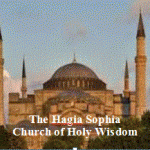 In this article I will be looking at the basic theology (i.e., study of God) that serves as the foundation of our Church. It is the theology of the Eastern Church which is, I would suggest, different than that of the Western Church, finding its foundation in our liturgical life. It is as catholic as that of the Roman Church but it is different.
In this article I will be looking at the basic theology (i.e., study of God) that serves as the foundation of our Church. It is the theology of the Eastern Church which is, I would suggest, different than that of the Western Church, finding its foundation in our liturgical life. It is as catholic as that of the Roman Church but it is different.
The early Christian understanding of creation and of man’s ultimate destiny, which is the understanding of our Church, is truly inseparable from our understanding of the Spirit of God or, in theological terms, pneumatology.
The term pneumatology comes from two Greek words namely pneuma, which means wind, breath or spirit, and logos, which means word, matter or thing. As it is used in Christian theology it refers to the study of the biblical doctrine of the Holy Spirit. Generally this includes such topics as the personality of the Spirit, the deity of the Spirit, and the work of the Spirit throughout Scripture.
But the doctrine of the Holy Spirit in the New Testament and in the early Fathers cannot easily be reduced to a system of concepts. The fourth-century discussions on the divinity of the Spirit remained in the context of salvation. Since the action of the Spirit gives life in Christ, He cannot be a creature. He is indeed consubstantial with the Father and the Son. This argument was used by both Athanasius and Basil. These two patristic Fathers remained, throughout the Byzantine period, the standard authorities with regard to the Holy Spirit. Except in the controversy around the Filioque – a debate about the nature of God rather than about the Spirit specifically – there was little conceptual development about pneumatology in the Byzantine Middle Ages. This does not mean that the experience of the Spirit was not emphasized with greater strength than in the West, especially in hymnology, in spiritual literature and in theology about the sacraments or mysteries.
We must remember that the debate about the Filioque was this: did the Spirit precede from both the Father and the Son or only from the Father. The Eastern Church’s belief and understanding about the Trinity says that both the Son and the Spirit proceed from the Father – He is the source of all existence. The Western Church changed the wording of the Creed to read that the Spirit proceeded from the Father and the Son, which would, according to Eastern theology, make the Spirit less equal and not consubstantial with the Father. This is why our Creed is different from that of the Roman Church.
